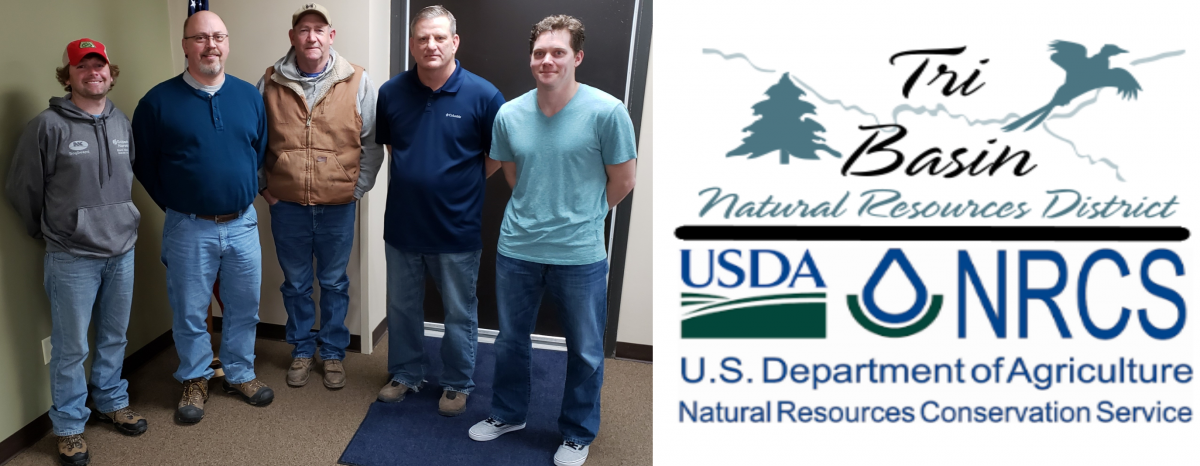By: Tessa Burford, TAPS Team Member
Many competitors of UNL’s Testing Ag Performance Solutions (TAPS) program are agricultural producers by trade. TAPS, however, is open to contestants despite their individual profession(s). For the Tri-Basin Natural Resources District (NRD) and the USDA’s Natural Resources Conservation Service (NRCS), participation in TAPS has meant better relating to the people they directly serve. In 2021, Nott and Scheele both marked their third year of competition in TAPS. Each part of the same team, their crew has also consisted of local farmers and crop consultants. To learn more about their involvement, TAPS spoke to Pat Nott of Tri-Basin NRD and Curtis Scheele with the NRCS.

How would you describe your TAPS experience?
Pat Nott: I have really enjoyed and benefited from the competition. I work for an NRD, where conserving water quality and quantity is our goal. This contest has been a learning experience that I can use to relate to farmers, and also use to help farmers with their operations.
Curtis Scheele: My experience has been awesome! I don’t farm. My job with NRCS is working with the irrigators to improve their irrigation scheduling and fertilizer applications, all in an effort to protect our water quality and quantity. TAPS gives me a hands-on experience, which adds a great dimension when visiting with producers. It’s more than just book education. I get to see real inputs and results.
Last season, your team won the TAPS Efficiency award in Subsurface Drip Irrigated (SDI) corn. Tell me about that?
Pat Nott: In our first year, our team was in the middle of the pack, in terms of efficiency. Our goal the next year was to increase our yield, while sticking to UNL recommendations or lower for nitrogen, and using just enough irrigation. We ended up 2nd in yield and winning the efficiency award, (UNL’s research team was more efficient,) due to meeting those goals.
You frequently use TAPS data in your presentations at producer clinics. Tell me about that?
Curtis Scheele: I reach roughly 1,200 people per year via Nitrogen/Pesticide Certification trainings and my Tri-Basin Irrigator newsletter, [and] more through our Conservation Stewardship Program (CSP) and Environmental Quality Incentives Program (EQIP) programs. The data I am looking for are similar hybrids to compare yields, population, nitrogen applied, irrigation applied, and rainfall. Pivots are compared with pivots, and SDI with SDI. Pivots are not compared to SDI. I don’t get as many comparable situations as I would like. UNL, the last couple of years, has planted a single hybrid on all plots. This is great, as they can compare all the different irrigation and nitrogen amounts on one hybrid and one population. I hope they start presenting that info to the public soon. It does no good sitting on a shelf [and] producers need this information.
How do you use your TAPS involvement to help teach others through your position with the Tri-Basin NRD or the USDA-NRCS?
Pat Nott: Our NRD has Groundwater Quality Management areas to address nitrates. Part of the requirement for producers in those areas is to attend Nitrogen Management classes with us. I have replaced some of the less interesting stuff in my presentation with TAPS information, and I think farms are more interested in that. We compare yields on plots with the same hybrids that used more or less nitrogen and irrigation. I also try to talk about TAPS with farmers in the summer, while doing chemigation inspections.
Curtis Scheele: By comparing strategies using the same hybrids to promote wise use of irrigation and nitrogen. This information is provided to producers at Nitrogen/Pesticide Certification meetings and in my irrigation newsletter. I also visit with producers about it, as I review their crop season irrigation and fertilizer records for our CSP and EQIP programs. Our team also educates ourselves by analyzing the data and determining winning strategies, [which] helps us learn, so we can promote. We also have partner meetings with NRCS monthly, our county Extension Educator, and someone from Central Nebraska Public Power and Irrigation District. This is not our team, but we discuss this stuff [then], as well.
Anything else that you would like to share about TAPS, your involvement, or otherwise?
Pat Nott: I love the contest. It has become part of [my] job at Tri-Basin, and I have learned so much. I grew up on a small farm, but I am not a farmer. This contest has taught me more about nitrogen and water usage, but also taught me things I didn’t have a clue about, like marketing and insurance and more. I hope there is room for me and my team in the future. We are having a blast and learning a lot.
Curtis Scheele: This is a great educational tool. Farmers can compare strategies with their own farm or with others. Agency personnel like myself can learn from it, as well, and use the information to promote the wise use of irrigation and nitrogen. I like the single hybrid on all plots to reduce variability from all the different strategies. This way, you can really tell what strategies worked best. It adds an extra educational dimension. I hope our team can continue to participate, as we try and take the information and promote strategies to protect our water resource. The more info we can get, the better. Water is so critical to our future, and we need to protect it. The more people out there promoting it, the better, [and] I appreciate the information UNL lets us have and share.
The TAPS team kindly thanks both Pat Nott and Curtis Scheele for their involvement in the TAPS program, as well as their desire to share what they have learned with others.
If you or someone you know may be interested in competing in any of the upcoming TAPS 2022 competitions please visit the TAPS website or contact Krystle Rhoades, TAPS Program Manager.